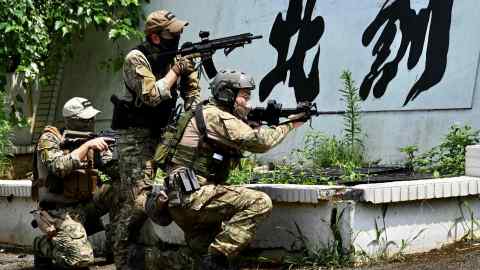China has blocked imports from hundreds of Taiwanese food producers in what Taipei sees as the opening shot in a campaign to economically punish the country for a visit by US House Speaker Nancy Pelosi.
Since Monday night, when US and Taiwanese officials confirmed that Pelosi would travel to Taiwan on Wednesday to meet President Tsai Ing-wen, Chinese customs officials have suspended imports of more than 2,000 of about 3,200 food items from Taiwan.
Beijing has a long history of punishing other countries for behavior it hates by cutting them off from its market and has made extensive use of such levers against Taiwan. But analysts and government officials said the move was a huge extension of such economic warfare.
“In the past, China hit individual primary sector products, such as specific fruits or fish – that way, they limited the overall macroeconomic impact on Taiwan, but allowed them to target regions where the Democratic Progressive Party is strong.” said Chiu Chui-cheng, vice chairman of the Mainland Affairs Council, Taiwan’s cabinet-level policy body for China.
“But now they’re expanding this massively because they’re targeting processed foods, which gives them tremendous extortion powers,” Chiu said. “This is probably just the beginning. We are confident that they will further increase their economic coercive measures.”
The Chinese Communist Party is extremely hostile to Tsai’s DPP, which it describes as “independence elements of Taiwan”, despite the party’s support for maintaining the status quo in the Taiwan Strait.
The ban could weaken the DPP in local elections taking place in November, when voters typically focus on local economic, social and environmental issues.
In early 2021, China banned Taiwanese pineapples, a move that the Tsai government tackled with a viral campaign marketing the fruit as “freedom pineapple” and “democratic pineapple”, helping to open up alternative export markets.
Beijing has also blocked imports of wax apples and custard apples, and this year has blacklisted Grouper.
While China has long been a major export market for Taiwan’s agricultural and fishery products, those shipments total just $200 million a year — a fraction of Taiwan’s total exports to China.
The imports Beijing has suspended now span 35 categories, including fish and seafood, edible oils and biscuits and cakes, and hit publicly traded companies such as instant noodle and soy sauce producer Ve Wong and Chi Mei, which makes frozen foods.
Recommended
Officials said they were still evaluating the potential damage from the Chinese move, but agreed it would be significant.
Chinese Customs made the import suspension public on its website by displaying “import suspended” for those Taiwanese companies that had not completed registration under the new rules.
The Taiwanese government said it would help companies complete registration, but added it was not hopeful that this would lead to the ban being lifted.

